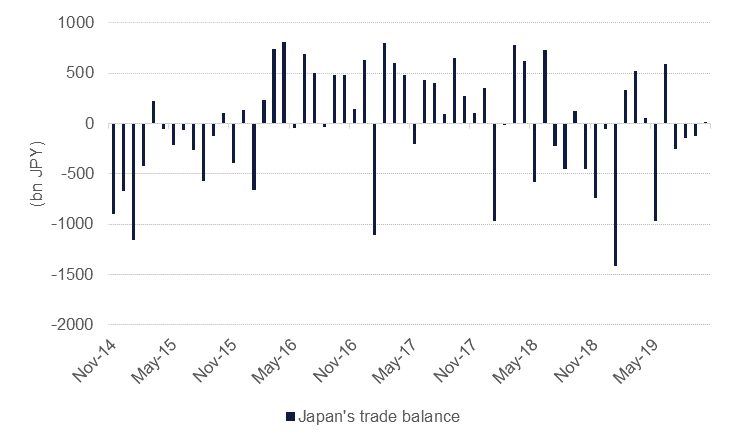
Japan's lower house of parliament approved on Tuesday a limited trade deal Prime Minister Shinzo Abe agreed with the United States. This will clear the way for tariff cuts next year on Japanese machine tools and other products while staving off the threat of higher U.S. car duties. The approval comes on the back of Japan and the United States formally signing the limited trade deal to cut tariffs on U.S. farm goods last month. The next step is to ratify the trade deal through the upper house for a vote, however its passage in the powerful lower house increases the chances it will come into force in January. According to estimates by the Japanese government the deal boost Japan’s economy by about 0.8% over the next 10-20 years, when the benefits kick in.
Saudi Aramco is seeing enough early demand to pull off the state oil giant’s IPO just three days into launching the deal according to a news report by Bloomberg. According to the report the IPO bankers are indicating that they already have nearly enough orders to cover the institutional portion of the deal, though they still have more than two weeks to go, as the stock can be subscribed until Dec. 4. The early momentum build up is important, especially in such large equity offerings, as it encourages investors to jump in when they see other institutions buying shares early on.
Further details have been disclosed on the insolvency law approved by the UAE Cabinet and to be enacted from next year. An official with the Ministry of Finance said debtors unable to resolve their obligations via a court-approved payment plan must sell assets such as property, cars, paintings or financial holdings in order to be able repay their creditors. Individuals who missed repayments or fear they will miss their next payment must approach their local court in the emirate they live within 40 days to start insolvency procedures. The statement added that if a repayment plan is agreed by the creditors and debtors via a court-approved adviser, debtors have three year period to repay their liabilities. However if they do not have the means to pay because of job loss or have missed payments of their debts for more than 50 consecutive working days, creditors can request the liquidation of the debtor’s assets.
The trade dispute between China and the US will now have to manage an additional hurdle as the US Congress passed a bill in support of protesters in Hong Kong. China’s foreign ministry has threatened retaliation if the bill becomes law and further resistance to US trade demands may be a result.
 Source: Emirates NBD Research
Source: Emirates NBD Research
Treasuries gained as concerns remained over the potential for a trade deal between the US and China. It seems déjà vu as Donald Trump and his officials seem to pull in different direction on the issue. Yields on the 2y UST, 5y UST and 10y UST closed at 1.57% (-2 bps), 1.62% (-1 bps) and 1.78% (-3 bps) respectively.
Regional bonds remained in a tight range. The YTW on Bloomberg Barclays GCC Credit and High Yield index closed at 3.28% while credit spreads widened slightly to 156 bps.
This morning, the dollar is slightly firmer against a basket of other currencies, the Dollar Index trading 0.10% higher. JPY is the exception to this, with the safe haven yen benefiting from Brexit uncertainties and concerns over the situation in Hong Kong having a negative impact on trade prospects. As we go to print, USDJPY is trading at 108.50, below the 200-day moving average. While the price remains below this level, it is likely that the price will decline further.
This evening investors will be looking towards the minutes from the previous Federal Reserve meeting at which policy makers cut interest rates for a third time in 2019. Should the minutes confirm Powell’s current position of standing pat on monetary policy, it could be supportive towards dollar strength.
Developed market equities closed positive despite weak earnings and ramping of rhetoric on trade front. The S&P 500 index closed flat while the DAX index added +0.1%.
Regional equities closed mostly higher. The DFM index and the Tadawul added +0.7% and +0.6% respectively. International Holdings gained +4.8% after the company said that it is not going ahead with acquisition of Shuaa Capital International. Elsewhere, Egyptian equities continued to remain under pressure with the EGX 30 index losing -0.5%.
Oil markets tumbled overnight thanks to negative headlines surrounding the chances of a China-US trade deal and private sector data that reported an increase in US inventories. WTI futures fell by 3.2% to settle at USD 55.21/b while Brent was down 2.5% at USD 60.91/b. Both contracts are treading water in early trade today.
The API reported a rise in US stocks of nearly 6m bbl last and official data from the EIA will be released later today. Markets are expecting a modest build of 1.5m bbl so any larger build, or convergence on API data, could sink prices further.
China’s foreign ministry threatened to retaliate to news that the US Congress passed a bill in support of protesters in Hong Kong. The most likely avenue for retaliation is on the trade discussions, for instance hardening China’s position that tariffs must be rolled back before any deal can be signed. The latest geopolitical escalation will add a new negative dynamic for commodity markets to have to chew over.